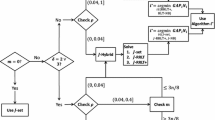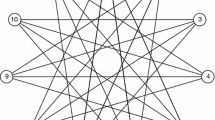Abstract
This paper explores equivalent, reduced size Reformulation-Linearization Technique (RLT)-based formulations for polynomial programming problems. Utilizing a basis partitioning scheme for an embedded linear equality subsystem, we show that a strict subset of RLT defining equalities imply the remaining ones. Applying this result, we derive significantly reduced RLT representations and develop certain coherent associated branching rules that assure convergence to a global optimum, along with static as well as dynamic basis selection strategies to implement the proposed procedure. In addition, we enhance the RLT relaxations with v-semidefinite cuts, which are empirically shown to further improve the relative performance of the reduced RLT method over the usual RLT approach. We present computational results for randomly generated instances to test the different proposed reduction strategies and to demonstrate the improvement in overall computational effort when such reduced RLT mechanisms are employed.
Similar content being viewed by others
References
Belotti P., Lee J., Liberti L., Margot F., Wächter A.: Branching and bounds tightening techniques for non-convex MINLP. Optim. Methods Softw. 24(4–5), 597–634 (2009)
Cafieri, S., Hansen, P., Liberti, L., Letocart, L., Messine, F.: Tight and compact convex relaxations for polynomial programming problems. Manuscript, LIX, École Polytechnique, F-91128 Palaiseau, France
Caprara A., Locatelli M.: Global optimization problems and domain reduction strategies. Math. Program. 125(1), 123–137 (2010)
Dalkiran, E.: http://filebox.vt.edu/users/dalkiran/website/#ProblemRRLT (2011)
Dalkiran, E., Sherali, H. D.: Theoretical filtering of RLT bound-factor constraints for solving polynomial programming problems to global optimality. Manuscript, Grado Department of Industrial and Systems Engineering, Virginia Tech, Blacksburg, VA (2011)
Floudas C.A., Visweswaran V.: Quadratic optimization. In: Horst, R., Pardalos, P.M. (eds.) Handbook of Global Optimization, pp. 217–270. Kluwer, Boston, MA (1995)
Gill P.E., Murray W., Saunders M.A.: An SQP algorithm for large-scale constrained optimization. SIAM Rev. 47(1), 99–131 (2005)
Liberti L.: Linearity embedded in nonconvex programs. J. Glob. Optim. 33, 157–196 (2005)
Liberti, L.: Effective RLT tightening in continuous bilinear programs. Internal Report 2003.18, Politecnico di Milano, 20133 Milano, Italy
Liberti L., Pantelides C.C.: An exact reformulation algorithm for large nonconvex NLPs involving bilinear terms. J. Glob. Optim. 36, 161–189 (2006)
MATLAB: version 7.6.0 (R2008a). The MathWorks Inc., Natick, MA (2008)
Ryoo H.S., Sahinidis N.V.: A branch-and-reduce approach to global optimization. J. Glob. Optim. 8(2), 107–138 (1996)
Sahinidis, N.V., Tawarmalani, M.: BARON 9.0.6: Global optimization of mixed-integer nonlinear programs. User’s Manual (2010)
Sherali H.D., Adams W.P.: A Reformulation-Linearization Technique for Solving Discrete and Continuous Nonconvex Problems. Kluwer, Boston, MA (1999)
Sherali, H.D., Dalkiran, E.: Combined bound-grid-factor constraints for enhancing RLT relaxations for polynomial programs. J. Glob. Optim. (2011). doi:10.1007/s10898-010-9639-0
Sherali, H.D., Dalkiran, E., Desai, J.: Enhancing RLT-based relaxations for polynomial programming problems via a new class of v-semidefinite cuts. Comput. Optim. Appl. (accepted for publication)
Sherali H.D., Fraticelli B.M.P.: Enhancing RLT relaxations via a new class of semidefinite cuts. J. Glob. Optim. 22, 233–261 (2002)
Sherali H.D., Smith J.C., Adams W.P.: Reduced first-level representations via the reformulation-linearization technique: results, counterexamples, and computations. Discrete Appl. Math. 101, 247–267 (2000)
Sherali H.D., Tuncbilek C.H.: A global optimization algorithm for polynomial programming problems using a reformulation-linearization technique. J. Glob. Optim. 2(1), 101–112 (1992)
Sherali H.D., Tuncbilek C.H.: A reformulation-convexification approach for solving nonconvex quadratic programming problems. J. Glob. Optim. 7, 1–31 (1995)
Sherali H.D., Tuncbilek C.H.: Comparison of two reformulation-linearization technique based linear programming relaxations for polynomial programming problems. J. Glob. Optim. 10, 381–390 (1997)
Sherali H.D., Tuncbilek C.H.: New reformulation linearization/convexification relaxations for univariate and multivariate polynomial programming problems. Oper. Res. Lett. 21(1), 1–9 (1997)
Shor N.Z.: Dual quadratic estimates in polynomial and Boolen programming. Ann. Oper. Res. 25, 163–168 (1990)
Tawarmalani M., Sahinidis N.V.: A polyhedral branch-and-cut approach to global optimization. Math. Program. 103, 225–249 (2005)
Author information
Authors and Affiliations
Corresponding author
Rights and permissions
About this article
Cite this article
Sherali, H.D., Dalkiran, E. & Liberti, L. Reduced RLT representations for nonconvex polynomial programming problems. J Glob Optim 52, 447–469 (2012). https://doi.org/10.1007/s10898-011-9757-3
Received:
Accepted:
Published:
Issue Date:
DOI: https://doi.org/10.1007/s10898-011-9757-3




